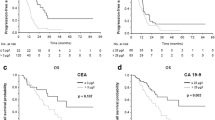Abstract
Serum marker evaluation is an easily available prognostic indicator that may help clinicians to discriminate patients with an aggressive disease; there are few and small-sized studies exploring the prognostic role of baseline carcinoembryonic antigen (CEA) values and their variations during first-line therapy, and even fewer data are available for carbohydrate antigen 19–9 (CA 19-9). Our aim was to analyze the role of those prognostic markers to exploit them in daily clinical practice. Data of 892 patients with marker determination before and 3 and/or 6 months during therapy were extracted from two institutional databases. Patients were grouped according to single marker variation as always negative (G0), decreasing (G1), stable (G2), or increasing (G3). We evaluated the progression-free survival (PFS) and the overall survival (OS) of all the patents and correlated them with CEA and CA 19-9 values. A concordance between response to therapy and marker decrease was evident in 50.2 % and in 34.4 % of the patients for CEA and CA 19-9. Patients with low CEA or CA 19-9 baseline values had a longer PFS (15.1 vs. 10.5; 13.6 vs. 10.2 months) and OS (32.0 vs. 22.3; 30.5 vs. 20.1 months). The same results of PFS and OS were obtained by analyzing the data of the four different groups. Multivariate analyses confirmed the independent prognostic role of CEA and CA 19-9. Baseline CEA and CA 19-9 levels and their kinetics demonstrated to be independent prognostic factors. CA 19-9 dosage is not recommended; a possible role of CA 19-9 in patients with negative CEA could be worth further evaluation.




Similar content being viewed by others
References
Jemal A, Bray F, Center MM, et al. Global cancer statistics. CA Cancer J Clin. 2011;61(2):69.
Goldstein MJ, Mitchell EP. Carcinoembryonic antigen in the staging and follow-up of patients with colorectal cancer. Cancer Investig. 2005;23(4):338–51.
Al-Sarraf M, Baker L, Talley RW, et al. The value of serial carcinoembryonic antigen (CEA) in predicting response rate and survival of patients with gastrointestinal cancer treated with chemotherapy. Cancer. 1979;44(4):1222–55.
De Gramont A, Krulic M, Kadi J, et al. High-dose folinic acid and 5-fluorouracil bolus and continuous infusion in advanced colorectal cancer. Eur J Cancer Clin Oncol. 1988;24(9):1499–503.
Barone C, Astone A, Cassano A, et al. Advanced colon cancer: staging and prognosis by CEA test. Oncology. 1990;47(2):128–32.
Michl M, Koch J, Laubender RP, et al. Tumor markers CEA and CA 19-9 correlate with radiological imaging in metastatic colorectal cancer patients receiving first-line chemotherapy. Tumour Biol. 2014 Jul 15.
Galli C, Basso D, Plebani M. CA 19-9: handle with care. Clin Chem Lab Med. 2013;51(7):1369–83.
Hayward JL, Carbone PP, Heuson JC, et al. Assessment of response to therapy in advanced breast cancer: a project of the programme on clinical oncology of the international union against cancer, Geneva, Switzerland. Cancer. 1977;39:1289–94.
Therasse P, Arbuck SG, Eisenhauer EA, et al. New guidelines to evaluate the response to treatment in solid tumors. J Natl Cancer Inst. 2000;92:205–16.
Boeck S, Haas M, Laubender RP, et al. Application of a time-varying covariate model to the analysis of CA 19-9 as serum biomarker in patients with advanced pancreatic cancer. Clin Cancer Res. 2010;16(3):986–94.
Custodio A, Feliu J. Prognostic and predictive biomarkers for epidermal growth factor receptor-targeted therapy in colorectal cancer: beyond KRAS mutations. Crit Rev Oncol Hematol. 2013;85(1):45–81.
Liao X, Morikawa T, Lochhead P, et al. Prognostic role of PIK3CA mutation in colorectal cancer: cohort study and literature review. Clin Cancer Res. 2012;18(8):2257–68.
Lochhead P, Imamura Y, Morikawa T, et al. Insulin-like growth factor 2 messenger RNA binding protein 3 (IGF2BP3) is a marker of unfavourable prognosis in colorectal cancer. Eur J Cancer. 2012;48(18):3405–13.
Stillwell AP, Ho YH, Veitch C. Systematic review of prognostic factors related to overall survival in patients with stage IV colorectal cancer and unresectable metastases. World J Surg. 2011;35:684–92.
Mitsuyama Y, Shiba H, Haruki K, et al. Carcinoembryonic antigen and carbohydrate antigen 19-9 are prognostic predictors of colorectal cancer with unresectable liver metastasis. Oncol Lett. 2012;3(4):767–71.
Altman DG, Lausen B, Sauerbrei W, et al. Dangers of using “optimal” cutpoints in the evaluation of prognostic factors. J Natl Cancer Inst. 1994;86:829–35.
Strimpakos AS, Cunningham D, Mikropoulos C, Petkar I, Barbachano J, Chau I. The impact of carcinoembryonic antigen flare in patients with advanced colorectal cancer receiving first-line chemotherapy. Ann Oncol. 2010;21:1013–9.
Boeck S, Stieber P, Holdenrieder S, et al. Prognostic and therapeutic significance of carbohydrate antigen 19-9 as tumor marker in patients with pancreatic cancer. Oncology. 2006;70:255–64.
Charbel H, Al-Kawas FH. Cholangiocarcinoma: epidemiology, risk factors, pathogenesis, and diagnosis. Curr Gastroenterol Rep. 2011;13(2):182–7.
Jamaludin AZ, Metassan MM, Zainal-Abidin Z, et al. Elevated serum CA 19-9 in association with Hashimoto thyroiditis. Singap Med J. 2010;51(8):143–5.
Bertino G, Ardiri AM, Calvagno GS, et al. In chronic viral hepatitis without malignancy, abnormal serum carbohydrate 19-9 antigen levels are associated with liver disease severity and are related to different viral aetiology. Dig Liver Dis. 2010;42:457–9.
Tampellini M, Berruti A, Bitossi R, et al. Prognostic significance of changes in CA 15-3 serum levels during chemotherapy in metastatic breast cancer patients. Breast Cancer Res Treat. 2006;98(3):241–8.
Author information
Authors and Affiliations
Corresponding author
Rights and permissions
About this article
Cite this article
Tampellini, M., Ottone, A., Alabiso, I. et al. The prognostic role of baseline CEA and CA 19-9 values and their time-dependent variations in advanced colorectal cancer patients submitted to first-line therapy. Tumor Biol. 36, 1519–1527 (2015). https://doi.org/10.1007/s13277-014-2693-3
Received:
Accepted:
Published:
Issue Date:
DOI: https://doi.org/10.1007/s13277-014-2693-3




